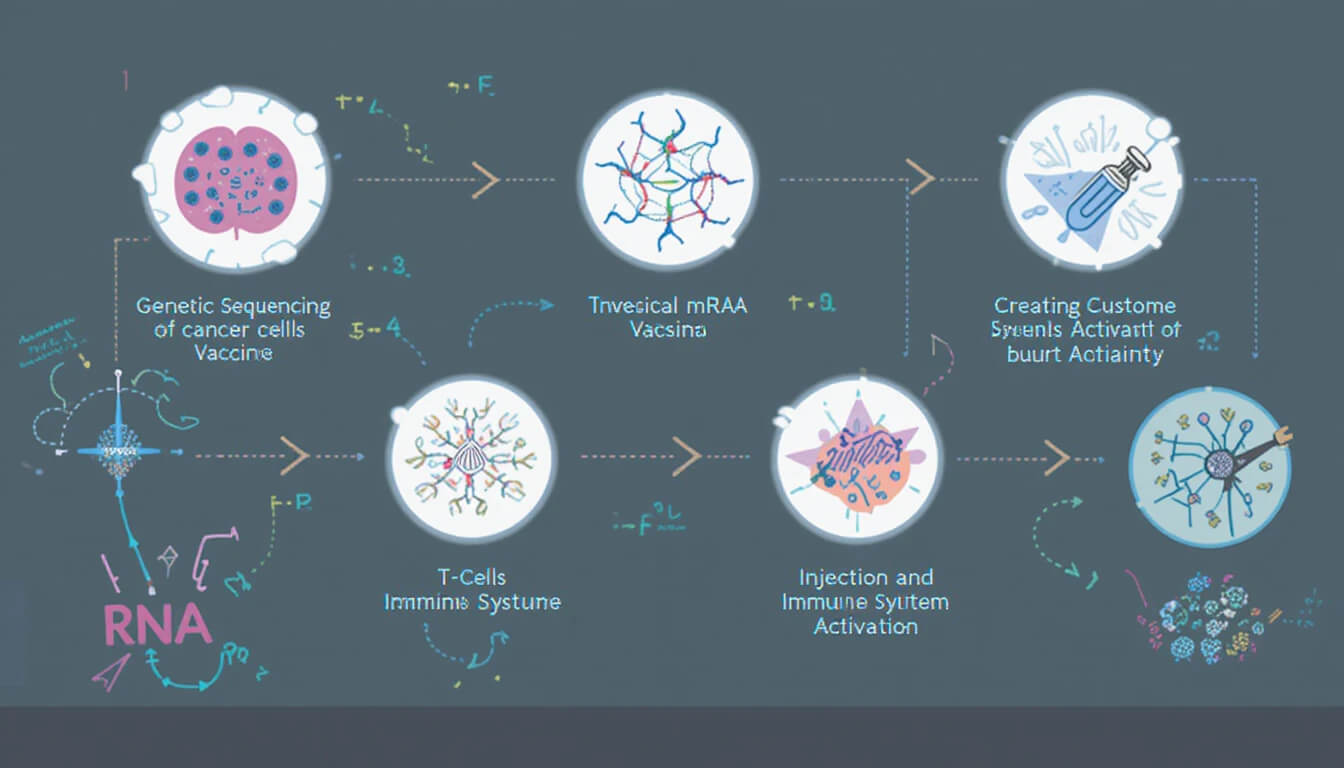Diving deep into the groundbreaking announcement from Russian scientists—what it means, how it works, and the journey ahead for this potential game-changer.
The words "you have cancer" are among the most dreaded in any language. They mark the beginning of a journey filled with uncertainty, fear, and a desperate search for hope. For decades, the world has prayed for a breakthrough—a new weapon in the arsenal against this relentless disease. Now, a groundbreaking announcement from Moscow has captured the world's attention.
Scientists in Russia claim they are on the cusp of a monumental achievement: a Russia cancer vaccine ready for use following successful trials. This news, delivered by prominent figures in Russian medical science, has sent ripples of cautious optimism through the global health community. But what does it really mean? Is this the miracle we've been waiting for?
In this comprehensive post, we'll unpack everything you need to know. We’ll explore the science behind this innovative treatment, analyze what the "successful trials" actually entail, and look at the realistic timeline for what comes next. Join us as we explore a new frontier of hope.
What Exactly is the Russia Cancer Vaccine?
First, it’s essential to clarify what kind of vaccine we're talking about. Unlike traditional vaccines that prevent diseases like measles or the flu (prophylactic), this is a therapeutic vaccine. This means it’s designed to treat people who already have cancer.
The research is spearheaded by the famed Gamaleya National Research Center for Epidemiology and Microbiology in Moscow—the same institution that developed the Sputnik V COVID-19 vaccine. According to Alexander Gintsburg, the head of the center, this isn't a one-size-fits-all shot. Instead, it’s a form of personalized medicine, tailor-made for each patient's specific type of tumor. The goal isn’t to prevent cancer from ever occurring but to teach a patient's own immune system how to find and destroy existing cancer cells and tumors.
How Does This Cancer Vaccine Work? The Science Simplified
The technology behind the Russia cancer vaccine is based on messenger RNA (mRNA), a technology that became a household name during the COVID-19 pandemic (used in the Pfizer and Moderna vaccines).
Here's a simple analogy to understand how it works:
-
Identifying the Enemy: Doctors take a biopsy of a patient’s tumor. They analyze its genetic makeup to find unique proteins (antigens) on the surface of the cancer cells—markers that don't appear on healthy cells.
-
Creating the "Most Wanted" Poster: Using this information, scientists create a custom mRNA strand. This mRNA strand contains the instructions for the patient’s body to create those specific cancer antigens.
-
Training the Immune System: This custom-made mRNA vaccine is then injected into the patient. The patient’s own cells read the mRNA instructions and start producing the harmless cancer antigens.
-
Seeking and Destroying: The patient's immune system sees these new antigens, recognizes them as foreign invaders, and mounts a powerful attack. It creates an army of T-cells specifically trained to hunt down and destroy anything in the body carrying that unique marker—which means they attack the actual tumor cells.
Essentially, the vaccine provides a "most wanted" poster to your immune system, turning it into a highly effective, cancer-targeting weapon.

The “Successful” Trials: What We Know (And What We Don’t)
According to official statements, the vaccine has undergone successful trials on mice. Reports indicate that mice with melanoma (skin cancer) who received the vaccine were still alive after 15-22 days, while the untreated mice died. Furthermore, the vaccine appeared effective in eliminating both primary tumors and metastases (cancer that has spread).
However, it is crucial to approach this with a blend of hope and scientific realism.
-
What We Know: The initial preclinical results on animal models are highly promising.
-
What We Don't Know: The detailed data from these trials has not yet been published in a peer-reviewed international scientific journal. Human clinical trials have not yet begun, and their scale, scope, and results are what truly matter for widespread approval and use.
The transition from successful animal trials to successful human trials is a significant hurdle, but this initial step is undeniably a cause for optimism.
A Personalized Approach: Is This a Vaccine for Every Cancer?
The technology's strength lies in its adaptability. Because it’s developed based on the unique genetic signature of a patient's tumor, it has the potential to be adapted for many types of cancer, including melanoma, lung cancer, and pancreatic cancer.
This personalized nature is a massive leap forward from traditional therapies like chemotherapy, which often damage healthy cells alongside cancerous ones. The Russia cancer vaccine aims to be far more targeted and, therefore, potentially have fewer side effects.
The Road Ahead: Hurdles, Timelines, and Global Availability
While the news is exciting, it's important to set realistic expectations. Here's the likely path forward:
-
Human Clinical Trials: The vaccine must go through rigorous, multi-phase human trials to prove its safety and efficacy. This process takes years.
-
Regulatory Approval: Health ministries in Russia, and then globally (like the FDA in the US and the EMA in Europe), must review the data and grant approval.
-
Manufacturing and Logistics: Scaling up the production of a personalized vaccine for millions is a complex logistical challenge.
While some Russian officials have expressed hope for availability within a few years, a globally accessible vaccine is likely much further down the road.
Context is Key: How Does This Compare to Other Cancer Vaccines?
Russia is not alone in this race. Companies like Moderna and BioNTech (the partner of Pfizer) are also in late-stage trials for their own personalized mRNA cancer vaccines.
-
Moderna and Merck: Are developing a vaccine for melanoma and non-small cell lung cancer, showing promising results in mid-stage trials.
-
BioNTech: Is also working on personalized treatments for various cancers.
The news from Russia adds another major player to this exciting field. This global competition is a good thing—it accelerates research, fosters innovation, and increases the chances of a life-saving breakthrough for all of humanity.
At Care and Prayer, we believe in the power of hope and information. Read our post on FDA Announces Major Covid Vaccine Update: What the New Restrictions Mean for You to learn more about offering meaningful support. According to the World Health Organization (WHO), cancer is a leading cause of death worldwide, underscoring the urgent need for new treatments.2. When will the Russia cancer vaccine be available to the public?
The timeline is not yet confirmed. After the initial preclinical trials on animals, the vaccine must undergo several phases of human clinical trials, which can take several years. Only after successful completion and regulatory approval would it become available.
3. Is this a preventative vaccine like the HPV vaccine?
No, this is a therapeutic vaccine, not a preventative (prophylactic) one. It is designed to treat existing cancer by training the immune system to attack it, whereas the HPV vaccine helps prevent the viral infections that can lead to certain cancers.
4. How is this different from chemotherapy?
Chemotherapy typically uses powerful drugs to kill fast-growing cells, which can include both cancer cells and healthy cells (like hair follicles and stomach lining), leading to significant side effects. This mRNA vaccine is a form of immunotherapy that aims to be highly specific, training the patient's own immune system to target only the cancer cells, potentially resulting in fewer side effects.
5. Where did this announcement come from?
The announcement was made by leading scientists from Russia's Gamaleya National Research Center for Epidemiology and Microbiology, a state-run medical research institution, and referenced by top Russian officials.
The announcement of a Russia cancer vaccine ready for trials marks a profoundly hopeful moment in the relentless fight against cancer. While we must temper our excitement with patience and scientific diligence, the potential of personalized mRNA technology to revolutionize cancer treatment cannot be overstated. This is not science fiction; it is the cutting edge of modern medicine, happening right now.
The journey from a lab in Moscow to a clinic near you is long, but every step forward is a victory. It’s a testament to human ingenuity and our collective desire to heal. We will continue to watch this story with prayerful and hopeful hearts, sharing credible updates as they become available.
What are your thoughts on this incredible news? Share your hope and reflections in the comments below.
Written by the team at Care and Prayer. We are dedicated to providing well-researched, compassionate content that brings hope, clarity, and support to individuals and families navigating health challenges. Our mission is to blend credible information with heartfelt encouragement for your wellness journey.
